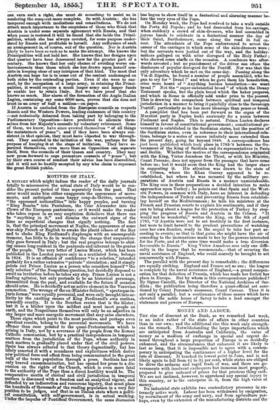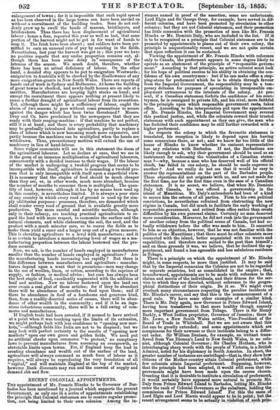MONEY AND LABOUR.
THE rise of discount at the Bank, as we remarked last week, is an index rather of the state of affairs in other countries than in our own ; and the additional rise this week only strength. ens the remark. Notwithstanding the large importations which are anticipated from Australia and California, the value of money as a medium of exchange in special and urgent de- mand throughout a large proportion of Europe is so decidedly enhanced, and the circumstances that enhanced it are likely to last so long, that it is impossible not to agree with a contem- porary in anticipating the continuance of a higher level for the rate of discount. It touched its lowest point in June, and is not likely again to fall from 41 to 31 per cent, while states are obliged to drive the arduous and rapid trade of war, and there are go- vernments with insolvent exchequers but immense inert property, prepared to give unheard-of prices for that precious thing cash. We are not inclined, however, to apprehend any special injury to this country, or to the enterprise in it, from the high value of money.
Its industrial state exhibits two contradictory processes in ex- tremely active work. Labour has been withdrawn by emigration,, by recruitment of the army and navy, and from agriculture per- haps, even by the extension of the manufacturing districts and the enlargement of towns ; for it is impossible that such rapid spread as has been observed in the large towns can have been carded on
-without a recruitment of the building trades. Sons do not sud-
denly grow up to swell the bands of masons, bricklayers, and brickmakers. Thus there has been displacement of agricultural labour ; hence a fear, repeated this year as well as last, that some portion of the harvest might not be got in for want of hands to reap it. The Irish have been absent ; and soldiers have been per- mitted to earn an unusual rate of pay by assisting in the fields.
Nevertheless, last year the harvest was got in ; this year we have no positive reports that any undue proportion remains out, al-
though there has been some delay in consequence of the lateness of the season. We much doubt, therefore, whether there has been an actual deficiency of labour. On the other hand, a decided atop appears to be put to emigration Westwards ; emigration to Australia will be checked by the disallowance of any more emigration-grants in New South Wales. There are reports of hands out of work in Sydney and Melbourne. At home the building of great towns is checked, and newly-built houses are on sale at a sacrifice. Manufacturers are keeping light stocks on hand ; and except the recruitment there appears nothing at present likely to cause a further draught of agricultural labour from its avocations. Yet, although there might be a sufficiency of labour, ought the alarm of two seasons to pass without some precautions to secure against the danger which has been twice threatened ? Messrs. Dray and Co. have proclaimed in the newspapers that they are ready with their reaping-machine : if that machine be not perfect, still it is at hand ; and there is every probability that machinery may be gradually introduced into agriculture, partly to replace a class of labour which is now becoming much more expensive, and partly because the machines can be multiplied when the hands are withdrawn. Thus, precautionary motives will extend the use of machinery in lieu of hand-labour.
Some vulgar economists will see in this statement the doom of the agricultural labourer. Let us declare at once, that we see in it the germ of an immense multiplication of agricultural labourers, concurrently with a decided increase to their wages. If the labour of the market is undergoing a twofold progress that seems to be incompatible with itself, agriculture is demanding a twofold pro- cess that is only incompatible with itself upon a superficial view. It is necessary that the staples of food should be much cheaper than they are, or, in other words, much more abundant, because the number of mouths to consume them is multiplied. The quan- tity of land, however, although it has by no means been used up in this country, is nevertheless limited. It is always a poor state of any country in which every rood of ground is used up for sim- ply utilitarian purposes : processes, therefore, are demanded which shall render every rood of ground that is available greatly more productive. The more careful and scientific methods, although only in their infancy, are teaching practical agriculturists to re- gard the land with more respect, to economize the surface and the natural elements, and while elaborating the soil, the seed, and the product with a much minuter care, so to coerce the fields as to make them yield a surer and a larger crop out of a given measure. This is elevating agriculture to a level with manufacture ; and it is as certain to introduce a manufacturing level of wages as a ma- nufacturing proportion between the labour bestowed and the pro- duce secured.
Now, we ask, is the number of hands employed in manufactures smaller than the number of hands employed in agriculture P Are the manufacturing hands increasing less rapidly ? But there is this difference between manufactures and agriculture : manufac- turers depend upon a want that is precarious—men may change in the use of woollen, linen, or cotton, according to the caprices of supply, or fashion, or medical advice ; but corn has always been the best staple of food, excellently augmented with the addition of beef and mutton. Now no labour bestowed upon the land can over create a real glut of those articles; for if they be abundant there will be abundance of mouths to feed upon them ; and if there be abundance in food of a handsome and generous kind, then, from a readily-descried series of causes, there will be abun- dance of other wealth in the community; and if it be an inge- nious industrious community, there will be a fall awing of com- merce and manufactures.
If English trade had been arrested, if it seemed to have arrived at a point when it was touching upon the limits of its extension, we might perhaps look with less confidence to "opening new mar- kets,"—although fields like India are not to be despised; but we may look with perfect certainty to the results of " opening new markets" upon our own green and golden fields. We need put no artificial checks upon commerce " to protect," no sumptuary laws to prevent manufactures from assuming an overgrowth, no atatutable limits upon towns. For, if England keep the lead in creating abundance and wealth out of the surface of the land, agriculture will always command as much force of labour as it requires, will always be reproducing the very foundation of all "capital," and will maintain England at the top of the market, however Bank discounts may run and the current of supply and demand ebb and flow.



























 Previous page
Previous page